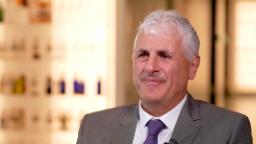
London
CNN
—
When Africa wants medication, too usually the continent should look overseas.
African nations devour about 25% of the vaccines produced on the planet, however import nearly 99% of their provide. in accordance with the African Union Growth Company. For packaged medicines, solely 36% of demand is produced domestically and solely 3% is equipped by regional commerce, in accordance with the World Financial Discussion board.
Of the roughly 600 packaged medication producers working on the continent, South Africa’s Aspen Pharmacare is without doubt one of the largest, with greater than 9,000 workers in additional than 50 nations. CEO Stephen Saad mentioned the way forward for the pharmaceutical sector in Africa and the teachings Aspen Pharmacare has realized from the Covid-19 pandemic, with CNN’s Eleni Giokos.
The next interview has been edited for size and readability.
Through the pandemic, now we have seen a deal with the inequalities that exist on the continent within the pharmaceutical sector. Aspen has had a really sturdy enterprise presence in Africa and now you might be transferring up the worth chain. Definitely Covid catalyzed quite a lot of the work you might be doing. Inform me what you might be doing.
Saad: You talked about inequalities. (Covid) actually received the world’s consideration by saying, “Hey, this does not appear proper.” We had been very happy with having the ability to ship vaccines to the continent within the portions we did, however the actuality of Covid was that Africa was not getting vaccinated. However what we have realized, whether or not it is AIDS or multidrug-resistant tuberculosis, is that now we have to be sturdy regionally. We have really doubled down and as an alternative of claiming, “Look, we have misplaced Covid vaccine volumes and so we’re closing,” we have really put in much more capability. We’re dedicated to a vaccine for one particular person in Africa and we’re working very laborious in the direction of that course of.
If I had been to ask you to explain what the pharmaceutical sector is like in Africa proper now, what would your reply be?
The reply is easy. When Covid got here and Africa wanted vaccines, over 90% of the vaccines had been equipped by India, and that wasn’t nice. In the long run, you possibly can’t ask politicians from different nations to produce another person earlier than them. I do not assume anybody desires Africans to endure, however the actuality is that when the borders are closed, whether or not it was Europe or India, they took care of their very own inhabitants first. If it hadn’t been for Aspen, there would have been no vaccines made in Africa for the continent.
Now some huge cash is concerned, there may be quite a lot of funding, there are quite a lot of initiatives, lots of them pushed by the federal government. We, on our personal, determined that we wish to be a supply not solely of vaccines however of organic merchandise; we would love to assist in oncology and diabetes. Now we have quite a lot of issues that we want to do throughout the continent to make it possible for now we have entry, as a result of there are quite a lot of ailments that aren’t being taken care of.
The World Commerce Group has achieved loads on the political entrance for Africa. We hope that the Continental Free Commerce Zone will vastly facilitate cross-border commerce within the pharmaceutical house. What challenges do you face?
There are quite a few challenges. Now we have services in Accra (Ghana), Dar-es-Salaam (Tanzania), Nairobi (Kenya)… It’s not all the time simple to get registrations permitted. You resolve to not put medicine in Kenya, for instance, due to the price of registration and the time it takes. Whereas if it was already registered, we might be exporting the manufacturing to a type of territories.
It is not a lot a tariff challenge or a commerce challenge, it is actually a regulatory challenge, requiring your drug to be registered in a selected nation in a selected manner. For instance, you possibly can register a product throughout Europe (by way of a central regulatory physique). I feel it’s one thing that Africa must also think about.
Even for those who say you might be doing properly, you continue to should make cash. How do you stability all these elements?
There’s this (false impression) that so that you can provide at an inexpensive value means it isn’t very worthwhile. A lot for economies of scale. I keep in mind after we had been making ARVs (antiretrovirals, used to deal with HIV) and we had been desperately attempting to scale back the value by nearly 90%. We received nice costs from everybody, however nonetheless misplaced. The choice we made was, let’s go for it. Within the worst case we might have a slightly costly social funding undertaking, however we supported that with elevated volumes we might have the ability to scale back costs. That is what occurred: the volumes got here in, the costs got here in, the applied sciences got here in and it grew to become inexpensive. So typically you simply should go in and do it. I can not let you know it was an actual science, however I feel it’s important to have a stability.
I feel the world acknowledges that there are individuals who will pay and there are individuals who cannot. Denying individuals who cannot pay just because they do not have the cash shouldn’t be a sustainable mannequin.


